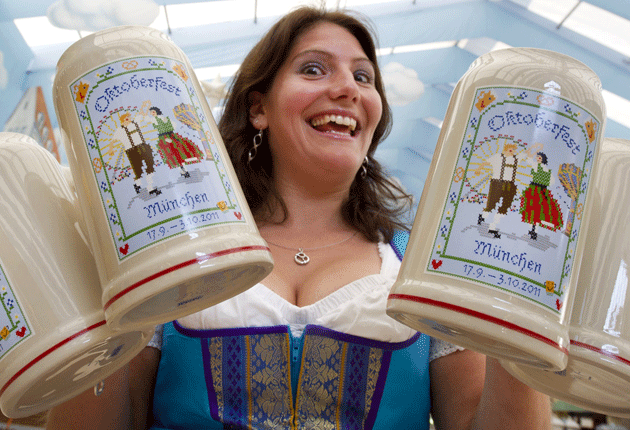
Your support helps us to tell the story
From reproductive rights to climate change to Big Tech, The Independent is on the ground when the story is developing. Whether it's investigating the financials of Elon Musk's pro-Trump PAC or producing our latest documentary, 'The A Word', which shines a light on the American women fighting for reproductive rights, we know how important it is to parse out the facts from the messaging.
At such a critical moment in US history, we need reporters on the ground. Your donation allows us to keep sending journalists to speak to both sides of the story.
The Independent is trusted by Americans across the entire political spectrum. And unlike many other quality news outlets, we choose not to lock Americans out of our reporting and analysis with paywalls. We believe quality journalism should be available to everyone, paid for by those who can afford it.
Your support makes all the difference.What courses? German or German studies (often offered as part of a joint honours degree with a multitude of other subjects)
What do you come out with? A BA or MA in Scottish universities.
Why do it? "If you’ve enjoyed German so far, don’t stop now, you are only at the beginning of your enjoyment and satisfaction – the more you learn, the more you have a real sense of achievement. A good knowledge of German will give you access to interesting, vibrant and hospitable countries in the heart of Europe – countries that are fun, as well as successful. What's more, there aren't many native English speakers who have high levels of German language. Germany is the economic motor of Europe and one of our biggest trading partners, and employers are keen to recruit German speakers. Furthermore, it’s not just the language – it’s the understanding of the people and the culture you’ll acquire that will impress. Yes, there are Mercedes and Siemens, but there are also buzzing cultural scenes of all kinds; theatre, music, film, literature and yes, there is even (funny) comedy!" – Patrick Stevenson, professor of German linguistics, University of Southampton
What's it all about? Language is at the core of all the courses regardless of where you choose to study, with a dissertation requirement in the final year. However, just like many other language degrees, you will find numerous combinations which go beyond German or German studies. Most of the universities will provide modules about German society and media, communication and the press, but a strong practical module in translation is a must. Cambridge offers you the opportunity of combining German with Asian languages, such as Persian and Arabic, but also to explore the historical roots of the language by taking modules in Ancient Latin and Neo Latin (the language used in Europe between c1350 and c1700). Other universities, such as Cardiff, provide two different first year programmes: one for beginners and the other one for those with A-level German.
Study options: The majority of British universities provide a four-year course, including one abroad. You will be able to choose between Germany, Austria and Switzerland, where students can work as assistant teachers or can study full-time under ERASMUS or Socrates programmes. Cambridge also gives the opportunity to look for a part or full-time work in local firms, museums, orchestras or NGOs, while in Bristol a very active student German Society organises events, visits to German cities and produces an annual play in German.
What will I need to do it? A-level in German at grade B is usually necessary, plus English at grade C. Average courses require ABB or ABC, however, top universities such as Edinburgh will ask for an AAA. Oxford will also interview the candidates and ask for an admission test in German.
What are my job prospects? In common with most other languages students, prospects for German graduates are reasonable. Many graduates go into management and consultancy, while the media and journalism are also popular. Many others move in translating or interpreting, or university administration roles. Law conversion courses are also popular. According to The Times’ Good University Guide 2012, around two thirds of graduates go straight into graduate-level jobs or further study, and salaries are just above average, at £20,657.
Where’s best to do it? According to the Complete University Guide 2012, tops are Oxford, Cambridge and Durham, followed by Bristol, St. Andrews and Southampton. For student satisfaction, the list differs, with Cambridge, Warwick and Bangor in the top three, followed by Northumbria, Birmingham and Swansea.
Related courses: French; Spanish; Italian; journalism; media; linguistics; history; politics and international studies; anthropology; classics.
Join our commenting forum
Join thought-provoking conversations, follow other Independent readers and see their replies
Comments